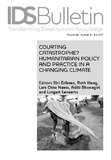Climate Change and Disasters: Institutional Complexities and Actors’ Priorities for Mitigation, Adaptation and Response
| dc.contributor.author | Nawab, Bahadar | |
| dc.contributor.author | Nyborg, Ingrid | |
| dc.coverage.spatial | Pakistan | en |
| dc.date.accessioned | 2017-08-01T12:31:25Z | |
| dc.date.available | 2017-08-01T12:31:25Z | |
| dc.date.issued | 2017-07-31 | |
| dc.identifier.uri | https://opendocs.ids.ac.uk/opendocs/handle/20.500.12413/13136 | |
| dc.description.abstract | Over the last decade, Pakistan has faced several major disasters, involving both natural hazards and conflict. These crises prompted tremendous national and international response, and triggered the Government of Pakistan to establish new institutions, policies, strategies and action plans. Donors, humanitarian and development organisations, however, tend to follow their own policies, plans and interests, which may be quite different from the government entities dealing with humanitarian efforts, climate change and disaster. To what extent do these different perspectives affect the ability of the government to respond effectively and coordinate with humanitarian and development organisations during different phases of a crisis? This article examines the existing institutions, policies and perspectives that guide how government, humanitarian and development organisations, and community members understand risk and vulnerability, and respond to climate changes. It suggests how knowledge sharing and coordination might be improved to better face the challenges of risk and vulnerability reduction in the future. | en |
| dc.language.iso | en | en |
| dc.publisher | Institute of Development Studies | en |
| dc.relation.ispartofseries | IDS Bulletin;48.4 | |
| dc.rights | This is an Open Access article distributed under the terms of the Creative Commons Attribution Non Commercial 4.0 International licence, which permits downloading and sharing provided the original authors and source are credited – but the work is not used for commercial purposes. http://creativecommons.org/licenses/by-nc/4.0/legalcode | en |
| dc.rights.uri | http://creativecommons.org/licenses/by-nc/4.0/ | en |
| dc.subject | Climate Change | en |
| dc.title | Climate Change and Disasters: Institutional Complexities and Actors’ Priorities for Mitigation, Adaptation and Response | en |
| dc.type | Series paper (IDS) | en |
| dc.rights.holder | Institute of Development Studies | en |
| dc.identifier.team | Resource Politics | en |
| dc.identifier.doi | 10.19088/1968-2017.152 | |
| dcterms.dateAccepted | 2017-07-31 | |
| rioxxterms.funder | Default funder | en |
| rioxxterms.identifier.project | Default project | en |
| rioxxterms.version | VoR | en |
| rioxxterms.funder.project | 9ce4e4dc-26e9-4d78-96e9-15e4dcac0642 | en |
Files in this item
This item appears in the following Collection(s)
Except where otherwise noted, this item's license is described as This is an Open Access article distributed under the terms of the Creative Commons Attribution Non Commercial 4.0 International licence, which permits downloading and sharing provided the original authors and source are credited – but the work is not used for commercial purposes. http://creativecommons.org/licenses/by-nc/4.0/legalcode


